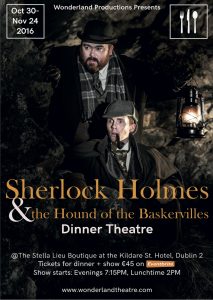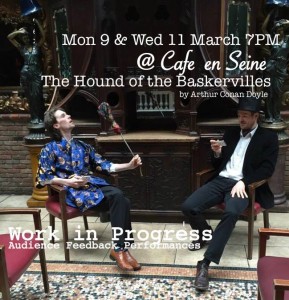By Patsy McGarry, The Irish Times (14th September) ✮✮✮✮✮
Reviewing The Miser’s Opening Night
Quite simply superb! Witty, wonderful, Wonderland. I had not seen a performance by Wonderland Productions before, though they have been in existence since 2003, nor have I come across a more promising company since the debut years of Rough Magic. A late beginning did not augur well, but that was soon forgotten as venue, performance, pace, writing and costumes wed into a intoxicating mix of what is probably Molière’s best farce. Translated, written and directed by the clearly multi-talented Alice Coghlan, it has been updated to Georgian Dublin (of the 1770s) with strong resonances for today. Martin Philips is utterly unsympathetic as Harpagon, as he should be, and I single him out only because he was the lead. There was not a weak link in the excellent cast. I just hope that when the Fringe Festival ends this production finds a home in a larger venue. It deserves to.
Michael Moffat, The Irish Mail on Sunday (16th September) ✮✮✮✮
Verdict: Fresh Molière shows us the filthy lucre…
This late play by Molière is pure seventeenth century situation comedy, satirising a soulless obsession with money. It’s full of misunderstandings, revelations, double-dealing servants and thwarted lovers.
A sparkling fast-paced production in the eighteenth century surroundings of the Joyce Centre in North Great St Georges’ St, at its core is the pathologically miserly widower Harpagon, keen to marry the lovely wealthy Mariane, who of course loves not him, but his penniless son Cléante. Harpagon’s daughter Élise is in love with the steward, but her father wants her to marry the elderly, wealthy Anselme. The subplots have Connolly Heron as a street-wise fixer sharper than his aristocratic masters, and Paul Nolan as a vengeful chef. There is other first class acting support from Sarah-Jayne Quigley (Élise), Eithne McGuiness as the unscrupulous matchmaker and Declan McGauran as Cléante.
Martin Philips gives a scintillating, exhausting performance as the skinflint Harpagon, in this adaptation by Alice Coghlan, who has moved the setting from Paris to eighteenth century Dublin and has thrown in occasional modern colloquialisms and references for comic effect, but has otherwise remained close to the original. Coghlan also directs with pace and an excellent eye for detail.
Emer O’Kelly, The Sunday Independent (16th September 2007)
Molière’s great satire is inventively staged by Coghlan’s company, Wonderland, in the drawing room of 35 North Great St Georges’ St (the James Joyce Centre) and there’s some fairly spiffing acting on display, particularly from Martin Philips in the title role, Shadaan Felfeli as Valère and Eithne McGuiness as the scheming Frosine.
John McKeown, The Daily Mail (14th September)
Reviewing The Miser’s Preview Night
Verdict: A rumbustious production
There’s a little irony in having a site-specific staging of one of Molière’s comedies. His plays could be improvised pretty much anywhere: tennis courts, inn yards, the halls of the great houses. Molière would certainly approve the choice of the Georgian rooms of the James Joyce Centre, however, and the cast leave little doubt that they could put this show on anywhere that has enough space or a couple of sash windows.
The audience is seated in the thick of the action, which concerns the efforts of the insanely avaricious money-lender Harpagon (Martin Philips) to keep secreted the strongbox full of money which he’s convinced everyone, including his two children – Cleanté (Declan McGauran) and Élise Sarah-Jayne Quigley) – are out to steal, and to get himself and his daughter married off with as little expense as humanly possible.
Mariane (Bernie O’Reilly) the girl he’s selected, is also the girl Cleanté has set his heart on, while Anselme (Alberto Albertino) the rich, middle-aged Italian he’s sacrificing Élise to, is the father of Valère (Shadaan Felfeli), his steward, Élise’s true lover.
The rest of the cast do a fine job of soaking up Harpagon’s dementia. McGauran’s tall, bewigged Cleanté is a visually appealing and amusing contrast with Harpagon’s sneering austerity. Eithne McGuinness as the marriage-broker is the plump epitome of lead painted amorality, one of the few characters who can hold Harpagon’s attention. The cast’s frequent exits and entrances could be timed more effectively, but all told it’s a good-looking boisterous production, which will doubtless sharpen up during the rest of its run.
Jane Brogan – A Preview of Wonderland’s The Miser
The French have a proverb: à père avare, fils prodigue (a tightwad father engenders a spendthrift son). This is something that Molière, being French, thought only too true and a good plot-catalyst for his classic comic farce, The Miser. However, it wasn’t simply the musings observed by 17th century French proverbs that led either Molière to write it in 1668, or Wonderland Productions to choose it as their offering to the 2007 Dublin Fringe Festival, but rather a morbid curiosity in the universal, timeless and fascinating human sickness that is greed.
The success of Wonderland’s 2005 Dublin Gay Theatre Festival production of Molière’s short play The Love Doctor, inspired Alice Coghlan, writer/director and founder of Wonderland to take on a full-length Molière play. Coghlan who is a French speaker translated The Miser after becoming frustrated with what she felt were stilted English translations, which betrayed the colour and “fire” of Molière’s French language. She adapted Molière’s play to Georgian Dublin and into the language of Georgian Dubliners from the street to the town houses.
Coghlan decided to move away from the proscenium arch format of traditional theatre and to present Molière’s farce in a manner which would bring his characters to life – as this Miser is literally performed in and around the audience – who are seated in the beautifully restored Georgian sitting rooms of The James Joyce Centre. Breaking down the imaginary “fourth wall” separating the life of the story from the reality of the audience, Wonderland’s production of The Miser injects new life into the 350-year- old script.
Because The Miser follows the unities of time, place and action, its performance in this naturalistic setting, where 1668 Paris is substituted with the Dublin of the 1770s, means that the audience literally eavesdrop on the ridiculous pursuits of the miserable Harpagon and his family. What is particularly lovely about this site-specific performance (which is set in real time throughout the course of an afternoon and evening) is that it is staged at dusk, meaning that the natural light changes from daylight to darkness and firelight – thus lending a particularly realistic and magical atmosphere to the entire experience.
As soon as the audience arrives at Harpagon’s home, actors in character and costume will usher them to their seats and help them with their transition from the present to eighteenth century Dublin. The play was adapted to the 1770s to suit both the rooms in which its performed as well as the materialistic values parodied in the story. Coghlan made the choice to adapt the setting, along with her Hibernio-English translation, to this period of economic growth in Dublin’s history, in order to highlight the materialistic values of Dublin’s last great economic boom, values which modern Dublin audience will identify with all too well.
The Miser is a funny and hauntingly relevant play, parodying and attacking the bourgeois approach to life and its inevitable cycle of endless discontent. As Declan McGauran who is playing the romantic, extrovert, Cleante, points out “this play is very funny but there is a darkness to the humour; it has reverberations for today’s audience as money is still a controlling factor in all our relationships. Everything is commodified now.” “I think it’s a great play for the Fringe audience” says Connolly Heron, playing Le Flèche, “especially the fact that it is set in Dublin, you see that Dublin hasn’t changed much really. I like the fact that it’s a comedy and it’s light but yet it’s also tragic and intense.” Coghlan clearly has an interest in capturing the zeitgeist of modern Dublin as well as sampling its moral fibre as her previous hit production which is currently on a national tour, Life Shop till you Drop! was a spoof of the modern self-help culture.
Just watching the fun the actors themselves have in rehearsal is infectious, and it is expected that this site-specific production of The Miser will be highly entertaining and accessible. Using a mixture of Irish Georgian history, a unique and realistic setting, splendid period wigs and costumes and plenty of laughs, Wonderland’s The Miser promises to be a carnival of theatre and most definitely one of the highlights of The Fringe this year.




